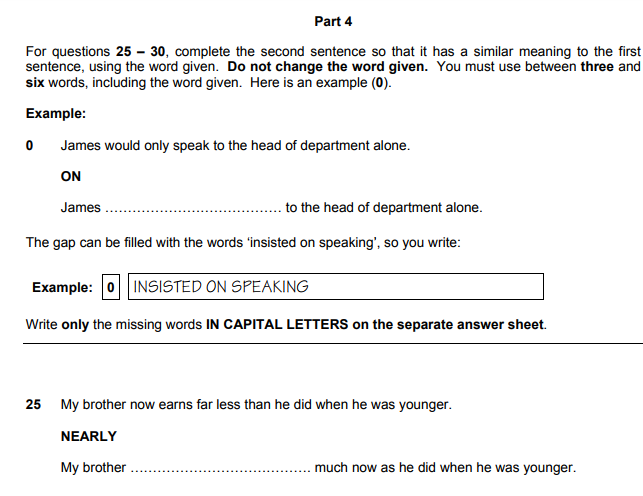Are you taking the Cambridge CAE or FCE Exam soon? Studying can be stressful, and so is test day! How should you study? What should you study? And what should you expect on test day? There are so many questions students have! Here are 5 things you need to know before taking the Cambridge CAE or FCE Exam.
5 Things You Need To Know Before Taking The Cambridge CAE or FCE Exam
There is a right way to study
Cambridge CAE and FCE exams have four official parts: Reading and Use of English, Writing, Listening, and Speaking. In each of these parts (called “modules”), there are many smaller parts; for example, Reading and Use of English for FCE has 7 parts (8 for CAE); Speaking has 4 parts, Listening has 4 . . . it’s a complicated test! Many students do not know where to begin.
Self-study is possible using the materials Cambridge has purchased. However, with such a complex test and so many parts, students often get confused . . . plus, there is no way to improve your speaking with self-study. A qualified instructor is necessary to help you understand each part of the test and the tips and tricks for passing each section. A teacher will also help you improve your pronunciation and speaking confidence.
On test day, know what to bring (and what not to bring)
Make sure you bring your valid photo ID, pencils, and erasers to the test. Electronics cannot be brought into the room, so if you want to watch the time, bring a watch (or use the clock that will be in the room). Food and drinks are also not allowed.
For more information, read these documents about Exam Day Tips for the paper-based test and the Speaking Module. They are from Cambridge ESOL.
Exam Day Tips, Paper-Based Test
Exam Day Tips, Speaking Module
You can also read Cambridge’s official Summary of Test Day Regulations for Candidates.
Understanding the test format saves time
Picture this: the Speaking Module recording begins, and the beginning of the recording is the instructions for the test. If you know the test rules, you do not have to listen to this portion of the test: instead, you have extra time to read the contents of the test.
For some, the test format is a little strange; for example, in the CAE Reading and Use of English Part 4, you must rewrite a sentence. Half of the new sentence is already written: you must use one given word plus 2-5 more words to complete the second sentence. What a strange format! If you know this in advance and have practiced this many times, this section is not a problem . . . but if you’ve only seen it a few times, you will probably have to read the instructions again. This is a waste of precious time.

When you consider that the entire test has many different parts (and that each part has different instructions and rules), then you see how understanding the test format saves time.
You can request your partner for the Speaking Module
Did you know that you can request your partner for the Speaking Module? You can! Talk to your Cambridge instructor about how to do this.
If you do not request your partner, you can still know who your assigned partner is before the speaking test. This gives you time to meet your partner and practice, which is very important to do before test day.
If you are assigned a partner who is very shy, check out our article on How To Deal With A Shy Speaking Test Partner.
Knowing what Cambridge wants will improve your score
Many parts of the Cambridge Exams (like Writing and Speaking) are not “right” or “wrong”; therefore, they are graded by trained teachers. But how are these instructors grading your test? Knowing what Cambridge wants will improve your score.
For example, the Writing Module is graded on the following:
– Content (Did you answer the prompt? Did you include enough information?)
– Communicative Achievement (Did you create the letter, report, review, essay, etc. as you were instructed? Did you correctly present your ideas to the reader?)
– Organisation (Are your sentences and paragraphs well connected?)
– Language (Did you use appropriate vocabulary, and a wide range of vocabulary? Did you use varying and complex sentence structures?).
A good Cambridge instructor will base his or her lessons on these things so that you have the tools you need to succeed in each module. Once you have these tools, you will use them as you write . . . and your score will improve.
Converse International School of Languages has been a trusted Cambridge Testing Centre for over 25 years and is proud to provide quality English instruction in small classes (no more than 8 students). To learn more about our Cambridge FCE and CAE programs, contact us.
